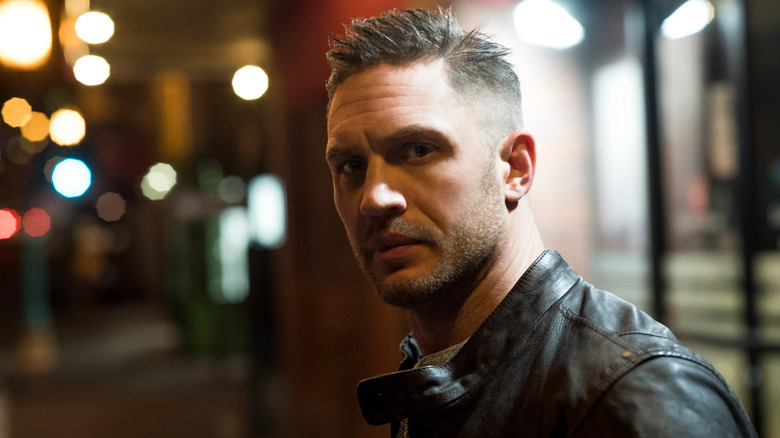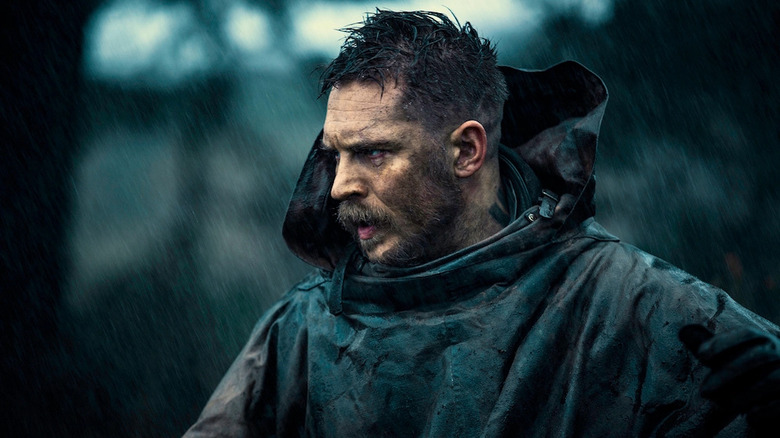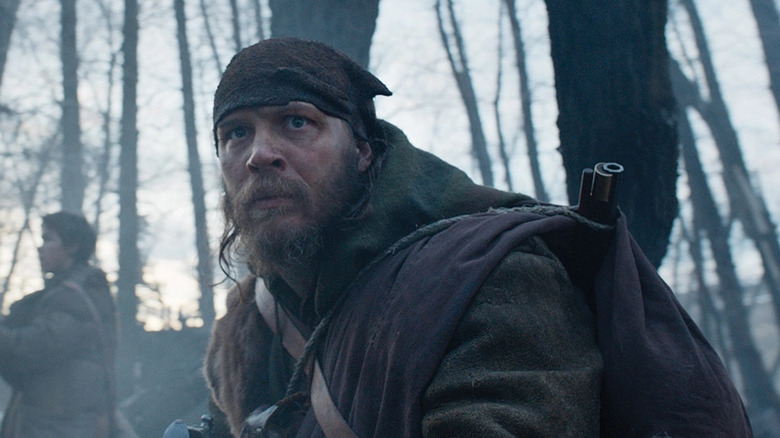Being A Leading Man Was Never A Priority For Tom Hardy
Tom Hardy may be regarded as one of Hollywood's few bonafide movie stars, but the actor has never made it a priority to be a leading man in his films. Sure, he has headlined his own superhero franchise in "Venom," but he has rarely gone out of his way to be the sole acting powerhouse in any given film. In fact, some of his best performances are in a supporting role, across the so-called "leading man." For example, in the three Christopher Nolan projects he's been in — "Inception," "The Dark Knight Rises," and "Dunkirk" — Hardy is relegated to being second (or third) fiddle to the lead performances. However, that doesn't mean he isn't as crucial as the protagonist. According to Hardy himself, he takes after the best talents in the business who have made their imprint on cinema as co-stars.
Let's be clear: Hardy is absolutely more than capable of carrying a project on his shoulders. But that's not something he seems to be interested in doing, even in his most prominent roles. He may be the titular character in "Mad Max: Fury Road," but he is on an equal playing ground with Charlize Theron's Furiosa. As a character actor, Hardy excels in bringing the best out of the individual across him.
Being a role player
Hardy revealed to AV Club his penchant for supporting roles, referencing other actors in the process. He also aptly compared his acting philosophy to a popular sport:
"I mean, you look at Dustin Hoffman, Gary Oldman, Philip Seymour Hoffman—these are great character actors. Not necessarily the lead, but what's so bad about playing a co-star? What makes you think that that's so different from playing the lead? The difference in some aspects is like playing soccer...There is no difference between passing the ball to someone's feet accurately than there is to the striker being accurate on the goal. Being a co-star or actor is as significant position on the field as it is to be a striker."
Aside from the shockingly accurate football analogy, Gary Oldman is a fascinating mention when it comes to being a co-star. Oldman has three Academy Award nominations for Best Actor under his belt, yet there is truth to what Hardy is saying. Like Hardy, Oldman has acted in supporting roles, including in the same film, Nolan's "The Dark Knight Rises." But if you look even closer at the trajectory of Oldman's career, it includes a bevy of memorable characters like Sirius Black in the "Harry Potter" saga, and some of his earliest work as the villain in "Léon: The Professional." If we were to compare one actor to another, I'd argue Oldman's resume is the closest to what Hardy brings to the table.
Lead actor or not, a key aspect of Hardy's thought process when it comes to acting is his commitment to supporting the person across from him.
Giving is to receive
Out of his many acting roles, the one performance that garnered Hardy an Academy Award nomination was playing the villain in the Leonardo DiCaprio-led "The Revenant." While DiCaprio is undeniably the protagonist in the film, Hardy more than holds his own and contributes to an engrossing back-and-forth dynamic with his co-star. If that film is a prime example of feeding off each other's energy, then count it as just one of Hardy's many attempts at prioritizing his fellow actor on-screen. Hardy stated the following to AV Club:
"These actors and the characters they play are imbued with the ability to actually lift the lead and one another up in a film, and apart from serving the script and the director's vision, but an actor's sole purpose, my sole purpose as an actor, is to feed my opposite actor as much as humanly possible in order for him or her to do their job. That's it. If I'm doing that for them, and they're in return doing that for me, then we have a lot of options, and you hopefully have the potential to capture some great drama. Then we've done our job."
Coincidentally enough, the one and only Academy Award DiCaprio has won is for his work in "The Revenant." Both of their success is surely a result of their own individual efforts; however, it is no mistake that DiCaprio and Hardy raised their A-game simultaneously. The character work previously described by Hardy is not only instrumental to prop up the lead actor but it allowed him to elevate his own work.


